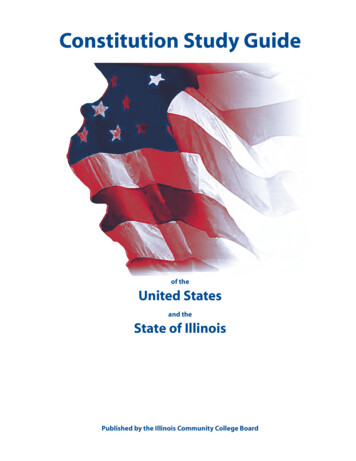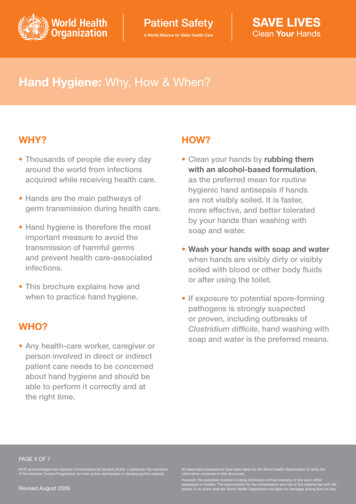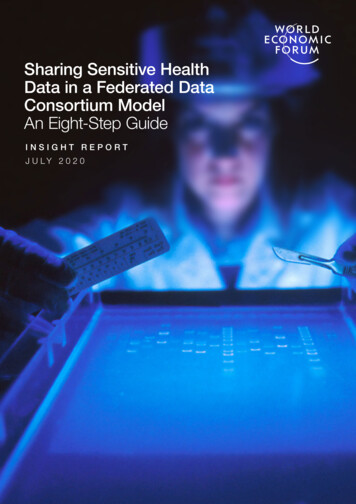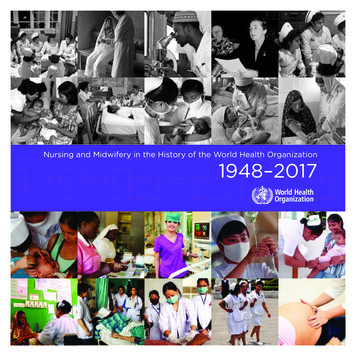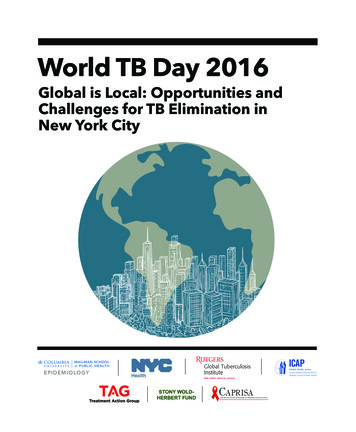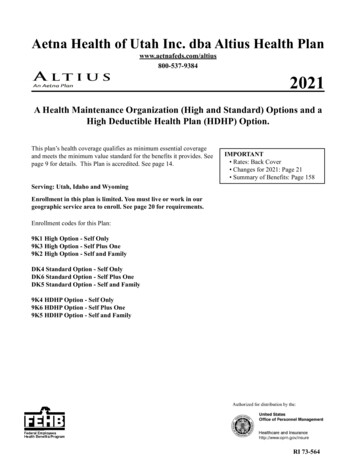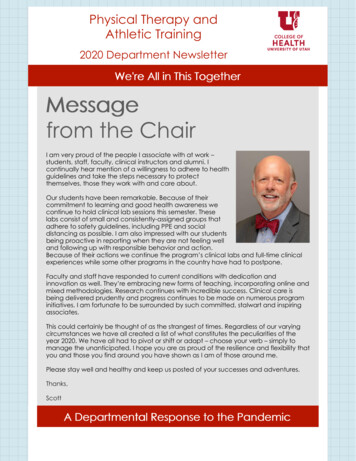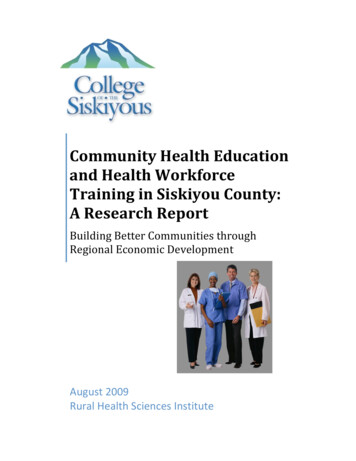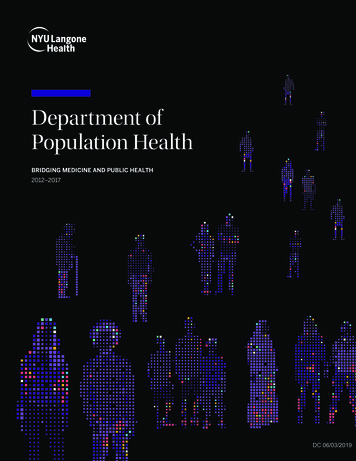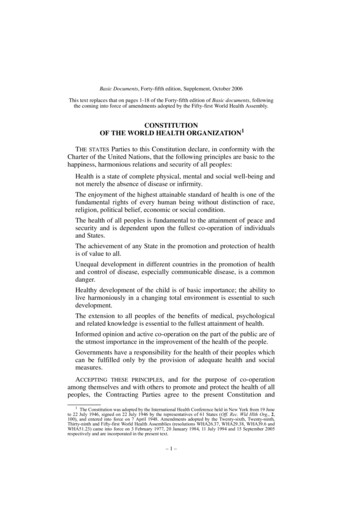
Transcription
CONSTITUTION OF WHO1Basic Documents, Forty-fifth edition, Supplement, October 2006This text replaces that on pages 1-18 of the Forty-fifth edition of Basic documents, followingthe coming into force of amendments adopted by the Fifty-first World Health Assembly.CONSTITUTIONOF THE WORLD HEALTH ORGANIZATION1THE STATES Parties to this Constitution declare, in conformity with theCharter of the United Nations, that the following principles are basic to thehappiness, harmonious relations and security of all peoples:Health is a state of complete physical, mental and social well-being andnot merely the absence of disease or infirmity.The enjoyment of the highest attainable standard of health is one of thefundamental rights of every human being without distinction of race,religion, political belief, economic or social condition.The health of all peoples is fundamental to the attainment of peace andsecurity and is dependent upon the fullest co-operation of individualsand States.The achievement of any State in the promotion and protection of healthis of value to all.Unequal development in different countries in the promotion of healthand control of disease, especially communicable disease, is a commondanger.Healthy development of the child is of basic importance; the ability tolive harmoniously in a changing total environment is essential to suchdevelopment.The extension to all peoples of the benefits of medical, psychologicaland related knowledge is essential to the fullest attainment of health.Informed opinion and active co-operation on the part of the public are ofthe utmost importance in the improvement of the health of the people.Governments have a responsibility for the health of their peoples whichcan be fulfilled only by the provision of adequate health and socialmeasures.ACCEPTING THESE PRINCIPLES, and for the purpose of co-operationamong themselves and with others to promote and protect the health of allpeoples, the Contracting Parties agree to the present Constitution and1The Constitution was adopted by the International Health Conference held in New York from 19 Juneto 22 July 1946, signed on 22 July 1946 by the representatives of 61 States (Off. Rec. Wld Hlth Org., 2,100), and entered into force on 7 April 1948. Amendments adopted by the Twenty-sixth, Twenty-ninth,Thirty-ninth and Fifty-first World Health Assemblies (resolutions WHA26.37, WHA29.38, WHA39.6 andWHA51.23) came into force on 3 February 1977, 20 January 1984, 11 July 1994 and 15 September 2005respectively and are incorporated in the present text.–1–
2BASIC DOCUMENTS, Supplement 2006hereby establish the World Health Organization as a specialized agencywithin the terms of Article 57 of the Charter of the United Nations.CHAPTER I – OBJECTIVEArticle 1The objective of the World Health Organization (hereinafter called theOrganization) shall be the attainment by all peoples of the highest possiblelevel of health.CHAPTER II – FUNCTIONSArticle 2In order to achieve its objective, the functions of the Organization shallbe:(a) to act as the directing and co-ordinating authority on internationalhealth work;(b) to establish and maintain effective collaboration with the UnitedNations, specialized agencies, governmental health administrations,professional groups and such other organizations as may be deemedappropriate;(c) to assist Governments, upon request, in strengthening health services;(d) to furnish appropriate technical assistance and, in emergencies, necessary aid upon the request or acceptance of Governments;(e) to provide or assist in providing, upon the request of the UnitedNations, health services and facilities to special groups, such as thepeoples of trust territories;(f) to establish and maintain such administrative and technical services asmay be required, including epidemiological and statistical services;(g) to stimulate and advance work to eradicate epidemic, endemic andother diseases;(h) to promote, in co-operation with other specialized agencies where necessary, the prevention of accidental injuries;(i) to promote, in co-operation with other specialized agencies where necessary, the improvement of nutrition, housing, sanitation, recreation,economic or working conditions and other aspects of environmentalhygiene;(j) to promote co-operation among scientific and professional groupswhich contribute to the advancement of health;(k) to propose conventions, agreements and regulations, and make recommendations with respect to international health matters and to perform
CONSTITUTION OF WHO3such duties as may be assigned thereby to the Organization and areconsistent with its objective;(l) to promote maternal and child health and welfare and to foster the ability to live harmoniously in a changing total environment;(m) to foster activities in the field of mental health, especially those affecting the harmony of human relations;(n) to promote and conduct research in the field of health;(o) to promote improved standards of teaching and training in the health,medical and related professions;(p) to study and report on, in co-operation with other specialized agencieswhere necessary, administrative and social techniques affecting publichealth and medical care from preventive and curative points of view,including hospital services and social security;(q) to provide information, counsel and assistance in the field of health;(r) to assist in developing an informed public opinion among all peopleson matters of health;(s) to establish and revise as necessary international nomenclatures of diseases, of causes of death and of public health practices;(t) to standardize diagnostic procedures as necessary;(u) to develop, establish and promote international standards with respectto food, biological, pharmaceutical and similar products;(v) generally to take all necessary action to attain the objective of theOrganization.CHAPTER III – MEMBERSHIP AND ASSOCIATE MEMBERSHIPArticle 3Membership in the Organization shall be open to all States.Article 4Members of the United Nations may become Members of the Organization by signing or otherwise accepting this Constitution in accordance withthe provisions of Chapter XIX and in accordance with their constitutionalprocesses.Article 5The States whose Governments have been invited to send observers tothe International Health Conference held in New York, 1946, may become
4BASIC DOCUMENTS, Supplement 2006Members by signing or otherwise accepting this Constitution in accordancewith the provisions of Chapter XIX and in accordance with their constitutional processes provided that such signature or acceptance shall be completed before the first session of the Health Assembly.Article 6Subject to the conditions of any agreement between the United Nationsand the Organization, approved pursuant to Chapter XVI, States which donot become Members in accordance with Articles 4 and 5 may apply tobecome Members and shall be admitted as Members when their applicationhas been approved by a simple majority vote of the Health Assembly.Article 7 1If a Member fails to meet its financial obligations to the Organization orin other exceptional circumstances, the Health Assembly may, on such conditions as it thinks proper, suspend the voting privileges and services towhich a Member is entitled. The Health Assembly shall have the authorityto restore such voting privileges and services.Article 8Territories or groups of territories which are not responsible for the conduct of their international relations may be admitted as Associate Membersby the Health Assembly upon application made on behalf of such territoryor group of territories by the Member or other authority having responsibility for their international relations. Representatives of Associate Membersto the Health Assembly should be qualified by their technical competencein the field of health and should be chosen from the native population. Thenature and extent of the rights and obligations of Associate Members shallbe determined by the Health Assembly.CHAPTER IV – ORGANSArticle 9The work of the Organization shall be carried out by:(a) The World Health Assembly (herein called the Health Assembly);(b) The Executive Board (hereinafter called the Board);(c) The Secretariat.1The amendment to this Article adopted by the Eighteenth World Health Assembly (resolutionWHA18.48) has not yet come into force.
CONSTITUTION OF WHO5CHAPTER V – THE WORLD HEALTH ASSEMBLYArticle 10The Health Assembly shall be composed of delegates representingMembers.Article 11Each Member shall be represented by not more than three delegates, oneof whom shall be designated by the Member as chief delegate. These delegates should be chosen from among persons most qualified by their technical competence in the field of health, preferably representing the nationalhealth administration of the Member.Article 12Alternates and advisers may accompany delegates.Article 13The Health Assembly shall meet in regular annual session and in suchspecial sessions as may be necessary. Special sessions shall be convened atthe request of the Board or of a majority of the Members.Article 14The Health Assembly, at each annual session, shall select the country orregion in which the next annual session shall be held, the Board subsequently fixing the place. The Board shall determine the place where a special session shall be held.Article 15The Board, after consultation with the Secretary-General of the UnitedNations, shall determine the date of each annual and special session.Article 16The Health Assembly shall elect its President and other officers at thebeginning of each annual session. They shall hold office until their successors are elected.Article 17The Health Assembly shall adopt its own rules of procedure.
6BASIC DOCUMENTS, Supplement 2006Article 18The functions of the Health Assembly shall be:(a) to determine the policies of the Organization;(b) to name the Members entitled to designate a person to serve on theBoard;(c) to appoint the Director-General;(d) to review and approve reports and activities of the Board and of theDirector-General and to instruct the Board in regard to matters uponwhich action, study, investigation or report may be considered desirable;(e) to establish such committees as may be considered necessary for thework of the Organization;(f) to supervise the financial policies of the Organization and to review andapprove the budget;(g) to instruct the Board and the Director-General to bring to the attentionof Members and of international organizations, governmental or nongovernmental, any matter with regard to health which the HealthAssembly may consider appropriate;(h) to invite any organization, international or national, governmental ornon-governmental, which has responsibilities related to those of theOrganization, to appoint representatives to participate, without right ofvote, in its meetings or in those of the committees and conferences convened under its authority, on conditions prescribed by the HealthAssembly; but in the case of national organizations, invitations shall beissued only with the consent of the Government concerned;(i) to consider recommendations bearing on health made by the GeneralAssembly, the Economic and Social Council, the Security Council orTrusteeship Council of the United Nations, and to report to them on thesteps taken by the Organization to give effect to such recommendations;(j) to report to the Economic and Social Council in accordance with anyagreement between the Organization and the United Nations;(k) to promote and conduct research in the field of health by the personnelof the Organization, by the establishment of its own institutions or byco-operation with official or non-official institutions of any Memberwith the consent of its Government;(l) to establish such other institutions as it may consider desirable;(m) to take any other appropriate action to further the objective of theOrganization.
CONSTITUTION OF WHO7Article 19The Health Assembly shall have authority to adopt conventions oragreements with respect to any matter within the competence of the Organization. A two-thirds vote of the Health Assembly shall be required for theadoption of such conventions or agreements, which shall come into forcefor each Member when accepted by it in accordance with its constitutionalprocesses.Article 20Each Member undertakes that it will, within eighteen months after theadoption by the Health Assembly of a convention or agreement, take actionrelative to the acceptance of such convention or agreement. Each Membershall notify the Director-General of the action taken, and if it does notaccept such convention or agreement within the time limit, it will furnish astatement of the reasons for non-acceptance. In case of acceptance, eachMember agrees to make an annual report to the Director-General in accordance with Chapter XIV.Article 21The Health Assembly shall have authority to adopt regulations concerning:(a) sanitary and quarantine requirements and other procedures designed toprevent the international spread of disease;(b) nomenclatures with respect to diseases, causes of death and publichealth practices;(c) standards with respect to diagnostic procedures for international use;(d) standards with respect to the safety, purity and potency of biological,pharmaceutical and similar products moving in international commerce;(e) advertising and labelling of biological, pharmaceutical and similarproducts moving in international commerce.Article 22Regulations adopted pursuant to Article 21 shall come into force for allMembers after due notice has been given of their adoption by the HealthAssembly except for such Members as may notify the Director-General ofrejection or reservations within the period stated in the notice.
8BASIC DOCUMENTS, Supplement 2006Article 23The Health Assembly shall have authority to make recommendations toMembers with respect to any matter within the competence of the Organization.CHAPTER VI – THE EXECUTIVE BOARDArticle 24The Board shall consist of thirty-four persons designated by as manyMembers. The Health Assembly, taking into account an equitable geographical distribution, shall elect the Members entitled to designate a person to serve on the Board, provided that, of such Members, not less thanthree shall be elected from each of the regional organizations establishedpursuant to Article 44. Each of these Members should appoint to the Boarda person technically qualified in the field of health, who may be accompanied by alternates and advisers.Article 25These Members shall be elected for three years and may be re-elected,provided that of the Members elected at the first session of the HealthAssembly held after the coming into force of the amendment to this Constitution increasing the membership of the Board from thirty-two to thirtyfour the term of office of the additional Members elected shall, insofar asmay be necessary, be of such lesser duration as shall facilitate the electionof at least one Member from each regional organization in each year.Article 26The Board shall meet at least twice a year and shall determine the placeof each meeting.Article 27The Board shall elect its Chairman from among its members and shalladopt its own rules of procedure.Article 28The functions of the Board shall be:(a) to give effect to the decisions and policies of the Health Assembly;(b) to act as the executive organ of the Health Assembly;
CONSTITUTION OF WHO9(c) to perform any other functions entrusted to it by the Health Assembly;(d) to advise the Health Assembly on questions referred to it by that bodyand on matters assigned to the Organization by conventions, agreements and regulations;(e) to submit advice or proposals to the Health Assembly on its own initiative;(f) to prepare the agenda of meetings of the Health Assembly;(g) to submit to the Health Assembly for consideration and approval a general programme of work covering a specific period;(h) to study all questions within its competence;(i) to take emergency measures within the functions and financialresources of the Organization to deal with events requiring immediateaction. In particular it may authorize the Director-General to take thenecessary steps to combat epidemics, to participate in the organizationof health relief to victims of a calamity and to undertake studies andresearch the urgency of which has been drawn to the attention of theBoard by any Member or by the Director-General.Article 29The Board shall exercise on behalf of the whole Health Assembly thepowers delegated to it by that body.CHAPTER VII – THE SECRETARIATArticle 30The Secretariat shall comprise the Director-General and such technicaland administrative staff as the Organization may require.Article 31The Director-General shall be appointed by the Health Assembly on thenomination of the Board on such terms as the Health Assembly may determine. The Director-General, subject to the authority of the Board, shall bethe chief technical and administrative officer of the Organization.Article 32The Director-General shall be ex-officio Secretary of the Health Assembly, of the Board, of all commissions and committees of the Organizationand of conferences convened by it. He may delegate these functions.
10BASIC DOCUMENTS, Supplement 2006Article 33The Director-General or his representative may establish a procedure byagreement with Members, permitting him, for the purpose of discharginghis duties, to have direct access to their various departments, especially totheir health administrations and to national health organizations, governmental or non-governmental. He may also establish direct relations withinternational organizations whose activities come within the competence ofthe Organization. He shall keep regional offices informed on all mattersinvolving their respective areas.Article 34The Director-General shall prepare and submit to the Board the financialstatements and budget estimates of the Organization.Article 35The Director-General shall appoint the staff of the Secretariat in accordance with staff regulations established by the Health Assembly. The paramount consideration in the employment of the staff shall be to assure thatthe efficiency, integrity and internationally representative character of theSecretariat shall be maintained at the highest level. Due regard shall be paidalso to the importance of recruiting the staff on as wide a geographicalbasis as possible.Article 36The conditions of service of the staff of the Organization shall conformas far as possible with those of other United Nations organizations.Article 37In the performance of their duties the Director-General and the staffshall not seek or receive instructions from any government or from anyauthority external to the Organization. They shall refrain from any actionwhich might reflect on their position as international officers. Each Member of the Organization on its part undertakes to respect the exclusivelyinternational character of the Director-General and the staff and not to seekto influence them.CHAPTER VIII – COMMITTEESArticle 38The Board shall establish such committees as the Health Assembly maydirect and, on its own initiative or on the proposal of the Director-General,may establish any other committees considered desirable to serve any purpose within the competence of the Organization.
CONSTITUTION OF WHO11Article 39The Board, from time to time and in any event annually, shall review thenecessity for continuing each committee.Article 40The Board may provide for the creation of or the participation by theOrganization in joint or mixed committees with other organizations and forthe representation of the Organization in committees established by suchother organizations.CHAPTER IX – CONFERENCESArticle 41The Health Assembly or the Board may convene local, general, technical or other special conferences to consider any matter within the competence of the Organization and may provide for the representation at suchconferences of international organizations and, with the consent of theGovernment concerned, of national organizations, governmental or nongovernmental. The manner of such representation shall be determined bythe Health Assembly or the Board.Article 42The Board may provide for representation of the Organization at conferences in which the Board considers that the Organization has an interest.CHAPTER X – HEADQUARTERSArticle 43The location of the headquarters of the Organization shall be determinedby the Health Assembly after consultation with the United Nations.CHAPTER XI – REGIONAL ARRANGEMENTSArticle 44(a) The Health Assembly shall from time to time define the geographical areas in which it is desirable to establish a regional organization.(b) The Health Assembly may, with the consent of a majority of theMembers situated within each area so defined, establish a regional organization to meet the special needs of such area. There shall not be more thanone regional organization in each area.
12BASIC DOCUMENTS, Supplement 2006Article 45Each regional organization shall be an integral part of the Organizationin accordance with this Constitution.Article 46Each regional organization shall consist of a regional committee and aregional office.Article 47Regional committees shall be composed of representatives of the Member States and Associate Members in the region concerned. Territories orgroups of territories within the region, which are not responsible for theconduct of their international relations and which are not Associate Members, shall have the right to be represented and to participate in regionalcommittees. The nature and extent of the rights and obligations of these territories or groups of territories in regional committees shall be determinedby the Health Assembly in consultation with the Member or other authorityhaving responsibility for the international relations of these territories andwith the Member States in the region.Article 48Regional committees shall meet as often as necessary and shall determine the place of each meeting.Article 49Regional committees shall adopt their own rules of procedure.Article 50The functions of the regional committee shall be:(a) to formulate policies governing matters of an exclusively regional character;(b) to supervise the activities of the regional office;(c) to suggest to the regional office the calling of technical conferences andsuch additional work or investigation in health matters as in the opinionof the regional committee would promote the objective of the Organization within the region;(d) to co-operate with the respective regional committees of the UnitedNations and with those of other specialized agencies and with otherregional international organizations having interests in common withthe Organization;
CONSTITUTION OF WHO13(e) to tender advice, through the Director-General, to the Organization oninternational health matters which have wider than regional significance;(f) to recommend additional regional appropriations by the Governmentsof the respective regions if the proportion of the central budget of theOrganization allotted to that region is insufficient for the carrying-outof the regional functions;(g) such other functions as may be delegated to the regional committee bythe Health Assembly, the Board or the Director-General.Article 51Subject to the general authority of the Director-General of the Organization, the regional office shall be the administrative organ of the regionalcommittee. It shall, in addition, carry out within the region the decisions ofthe Health Assembly and of the Board.Article 52The head of the regional office shall be the Regional Director appointedby the Board in agreement with the regional committee.Article 53The staff of the regional office shall be appointed in a manner to bedetermined by agreement between the Director-General and the RegionalDirector.Article 54The Pan American Sanitary Organization1 represented by the PanAmerican Sanitary Bureau and the Pan American Sanitary Conferences,and all other inter-governmental regional health organizations in existenceprior to the date of signature of this Constitution, shall in due course beintegrated with the Organization. This integration shall be effected as soonas practicable through common action based on mutual consent of thecompetent authorities expressed through the organizations concerned.CHAPTER XII – BUDGET AND EXPENSESArticle 55The Director-General shall prepare and submit to the Board the budgetestimates of the Organization. The Board shall consider and submit to theHealth Assembly such budget estimates, together with any recommendations the Board may deem advisable.1Renamed “Pan American Health Organization” by decision of the XV Pan American Sanitary Conference, September-October 1958.
14BASIC DOCUMENTS, Supplement 2006Article 56Subject to any agreement between the Organization and the UnitedNations, the Health Assembly shall review and approve the budget estimates and shall apportion the expenses among the Members in accordancewith a scale to be fixed by the Health Assembly.Article 57The Health Assembly or the Board acting on behalf of the HealthAssembly may accept and administer gifts and bequests made to the Organization provided that the conditions attached to such gifts or bequests areacceptable to the Health Assembly or the Board and are consistent with theobjective and policies of the Organization.Article 58A special fund to be used at the discretion of the Board shall be established to meet emergencies and unforeseen contingencies.CHAPTER XIII – VOTINGArticle 59Each Member shall have one vote in the Health Assembly.Article 60(a) Decisions of the Health Assembly on important questions shall bemade by a two-thirds majority of the Members present and voting. Thesequestions shall include: the adoption of conventions or agreements; theapproval of agreements bringing the Organization into relation with theUnited Nations and inter-governmental organizations and agencies inaccordance with Articles 69, 70 and 72; amendments to this Constitution.(b) Decisions on other questions, including the determination of additional categories of questions to be decided by a two-thirds majority, shallbe made by a majority of the Members present and voting.(c) Voting on analogous matters in the Board and in committees of theOrganization shall be made in accordance with paragraphs (a) and (b) ofthis Article.CHAPTER XIV – REPORTS SUBMITTED BY STATESArticle 61Each Member shall report annually to the Organization on the actiontaken and progress achieved in improving the health of its people.
CONSTITUTION OF WHO15Article 62Each Member shall report annually on the action taken with respect torecommendations made to it by the Organization and with respect to conventions, agreements and regulations.Article 63Each Member shall communicate promptly to the Organization important laws, regulations, official reports and statistics pertaining to healthwhich have been published in the State concerned.Article 64Each Member shall provide statistical and epidemiological reports in amanner to be determined by the Health Assembly.Article 65Each Member shall transmit upon the request of the Board such additional information pertaining to health as may be practicable.CHAPTER XV – LEGAL CAPACITY, PRIVILEGES AND IMMUNITIESArticle 66The Organization shall enjoy in the territory of each Member such legalcapacity as may be necessary for the fulfilment of its objective and for theexercise of its functions.Article 67(a) The Organization shall enjoy in the territory of each Member suchprivileges and immunities as may be necessary for the fulfilment of itsobjective and for the exercise of its functions.(b) Representatives of Members, persons designated to serve on theBoard and technical and administrative personnel of the Organization shallsimilarly enjoy such privileges and immunities as are necessary for theindependent exercise of their functions in connexion with the Organization.Article 68Such legal capacity, privileges and immunities shall be defined in a separate agreement to be prepared by the Organization in consultation with theSecretary-General of the United Nations and concluded between the Members.
16BASIC DOCUMENTS, Supplement 2006CHAPTER XVI – RELATIONS WITH OTHER ORGANIZATIONSArticle 69The Organization shall be brought into relation with the United Nationsas one of the specialized agencies referred to in Article 57 of the Charter ofthe United Nations. The agreement or agreements bringing the Organization into relation with the United Nations shall be subject to approval by atwo-thirds vote of the Health Assembly.Article 70The Organization shall establish effective relations and co-operateclosely with such other inter-governmental organizations as may be desirable. Any formal agreement entered into with such organizations shall besubject to approval by a two-thirds vote of the Health Assembly.Article 71The Organization may, on matters within its competence, make suitablearrangements for consultation and co-operation with non-governmentalinternational organizations and, with the consent of the Government concerned, with national organizations, governmental or non-governmental.Article 72Subject to the approval by a two-thirds vote of the Health Assembly, theOrganization may take over from any other international organization oragency whose purpose and activities lie within the field of competence ofthe Organization such functions, resources and obligations as may be conferred upon the Organization by international agreement or by mutuallyacceptable arrangements entered into between the competent authorities ofthe respective organizations.CHAPTER XVII – AMENDMENTSArticle 73Texts of proposed amendments to this Constitution shall be communicated by the Director-General to Members at least six months in advance oftheir consideration by the
CONSTITUTION OF WHO 1 Basic Documents, Forty-fifth edition, Supplement, October 2006 This text replaces that on pages 1-18 of the Forty-fifth edition of Basic documents, following the coming into force of ame

